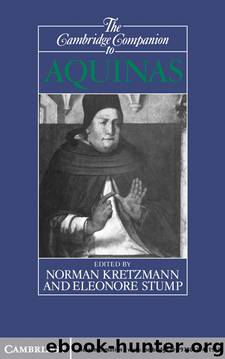The Cambridge Companion to Aquinas by Norman Kretzmann

Author:Norman Kretzmann
Language: eng
Format: epub, azw3, mobi
Publisher: Cambridge University Press
64 This introduction of Aquinas’s concept of will is based mainly on ST Ia.80.1; for a similar account, different in some important respects, see the earlier QDV 22.4.
65 For an introduction to this material, see, e.g., ST Ia.81.2. Like other features of Aquinas’s account of appetitive powers, his theory of the passions is developed as part of his treatise on ethics: ST IaIIae.22–48.
66 See, e.g., ST Ia.81.3, ad 3; and QDV 25.4c: “since one and the same thing can be considered under various conditions, being made [thereby] either attractive or repulsive, reason presents a thing to sensuality, by means of imagination, under the guise of the pleasurable or the painful, in accord with the way it seems to reason”; also QDV 25.4, ad 4 & ad 5.
67 For the moral implications, see Mclnerny’s Chapter 7. Lonergan 1971 contains a very well-informed, stimulating study of Aquinas’s account of human freedom; and for a very helpful discussion of relevant issues, see Stump 1990.
68 See Nicomachean Ethics III 3, 1111b 26–29; 6, 1113a15.
69 ST Ia.82.1c; 82.2c; following Aristotle, Physics II 9, 200a15–34.
70 Aquinas’s standard term for choice in his analysis of human action (in ST IaIIae.6–17) is electio. When he discusses what seems closest to a twentieth-century conception of free choice, he uses the term liberum arbitrium. But for more than one reason it seems worth preserving the terminological difference by translating arbitrium in this context as “decision.” See, e.g., ST Ia.83.3, ad 2: “Judgment (iudicium) is, so to speak, the conclusion and determination of deliberation. But deliberation is determined primarily, of course, by reason’s pronouncement (sententia) and secondarily by appetite’s acceptance [of that pronouncement]. That is why the Philosopher says in Ethics III[5, 1113a9–12] that ‘judging on the basis of deliberation, we desire in accordance with deliberation’. And in this way choice (electio) itself is called a kind of judgment, on the basis of which it is named free decision (liberum arbitrium).” This assimilation of choice to judgment via decision is an indication of the intimate relationship between will and reason on which Aquinas’s conception of freedom is based. See also n. 73 below.
71 In this connection Aquinas cites Aristotle: De anima III 10, 433a13–26; Metaphysics XII 7, 1072a26–30.
72 “Therefore, because what is apprehended by intellect is different in kind from what is apprehended by sense, it follows that the intellective appetite is a power different from the sensory appetite” (ST Ia.80.2c). Not all the difficulties in Aquinas’s apparently evolving theory of will can be even mentioned in this chapter. His most complete, unified discussion of relevant topics is probably the single article of QDM 6.
73 See also ST IaIIae.17.1, ad 2: “The root of freedom considered as the subject [of freedom] is will; considered as its cause, however, [the root of freedom] is reason. For will can be led (ferri) freely to various things just because reason can have various conceptions of what is good. And so philosophers define free decision (liberum arbitrium) as the free judgment of reason (liberum de ratione iudicium), as if [to indicate that] reason is freedom’s cause.
Download
The Cambridge Companion to Aquinas by Norman Kretzmann.azw3
The Cambridge Companion to Aquinas by Norman Kretzmann.mobi
This site does not store any files on its server. We only index and link to content provided by other sites. Please contact the content providers to delete copyright contents if any and email us, we'll remove relevant links or contents immediately.
The remains of the day by Kazuo Ishiguro(8961)
Tools of Titans by Timothy Ferriss(8357)
Giovanni's Room by James Baldwin(7313)
The Black Swan by Nassim Nicholas Taleb(7097)
Inner Engineering: A Yogi's Guide to Joy by Sadhguru(6780)
The Way of Zen by Alan W. Watts(6589)
Asking the Right Questions: A Guide to Critical Thinking by M. Neil Browne & Stuart M. Keeley(5747)
The Power of Now: A Guide to Spiritual Enlightenment by Eckhart Tolle(5740)
The Six Wives Of Henry VIII (WOMEN IN HISTORY) by Fraser Antonia(5492)
Astrophysics for People in a Hurry by Neil DeGrasse Tyson(5172)
Housekeeping by Marilynne Robinson(4430)
12 Rules for Life by Jordan B. Peterson(4298)
Double Down (Diary of a Wimpy Kid Book 11) by Jeff Kinney(4257)
The Ethical Slut by Janet W. Hardy(4235)
Skin in the Game by Nassim Nicholas Taleb(4231)
Ikigai by Héctor García & Francesc Miralles(4228)
The Art of Happiness by The Dalai Lama(4118)
Skin in the Game: Hidden Asymmetries in Daily Life by Nassim Nicholas Taleb(3985)
Walking by Henry David Thoreau(3948)
